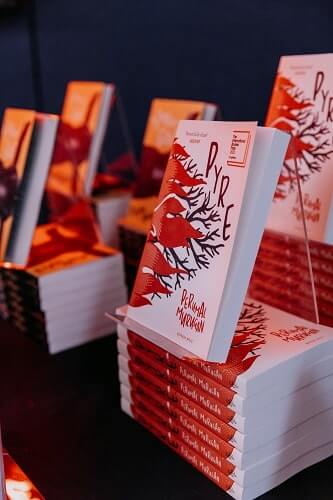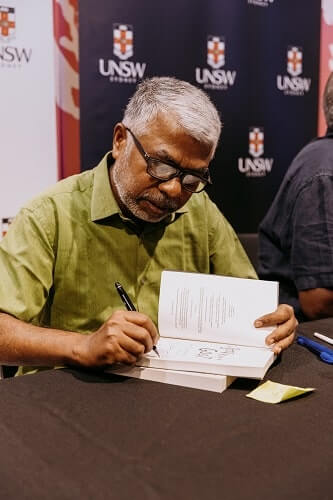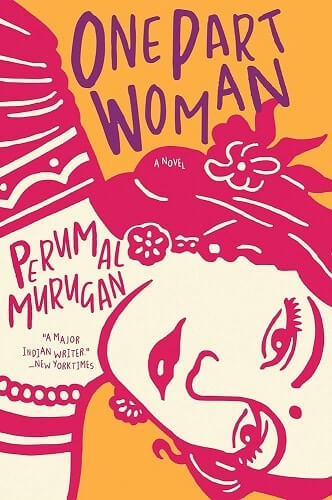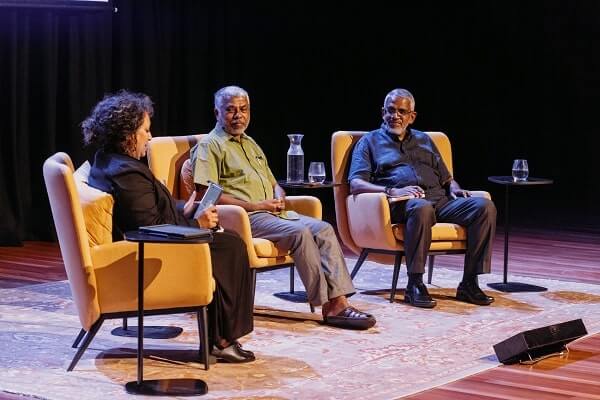“The writing process, for me, is both enjoyable and tormenting,” Tamil writer Perumal Murugan said in Sydney recently.
His statement revealed much about his extraordinary literary life, which has seen his book withdrawn, burnings, a self-imposed exile, and a longlist spot on the International Booker Prize.
Murugan was talking to writer and academic Dr Roanna Gonsalves, at a University of New South Wales event this month. Their conversation on stage took place through an interpreter at a packed Io Myers Studio.
Murugan’s books written in the Tamil language are available in English translation. He is a best-selling author and recipient of two National Book Awards. His work includes novels, collections of short stories and poetry, as well as non-fiction books. He is a Professor of Tamil literature and Vice President of PEN International. This is his first visit to Australia.

Dr Gonsalves quickly established a rapport with Murugan. He responded warmly and generously to her pertinent questions about his novel Pyre which was long listed for the 2023 International Booker Prize.
He spoke also about his novel One Part Woman which caused an uproar in India, the court case and judgement that followed, as well as his thoughts on the caste system and its implications both in the past and in the present.
Murugan explained how writing fiction gives him freedom to portray a deeper understanding of the human condition.
“I write about the movement of people, and different castes mixing in society.”
He spoke about the difference between city people and people who live in small villages, and how difficult it can be for them to accept and trust each other.
In his novel Pyre, Saroja from the city and Kumaresan from a small Tamil village fall in love and elope. When Saroja accompanies Kumaresan to his village as his wife, the people there suspect that she is from a different caste.

“Kumaresan tells her very clearly to not say anything about her caste, and that he would handle those queries,” Murugan outlined. “But now even he struggled in the face of such questions. How much worse would things get?”
Kumaresan’s widowed mother Marayi, whose heart has been broken by her son’s decision and who speaks to imaginary people to express her displeasure, refuses to accept her daughter-in-law. Saroja lives in fear realising that she “would have to live through this unending torment”. Then things do indeed get far worse.
Perumal Murugan’s ability to reveal the inner lives of his characters means readers are able to apperceive what his characters are thinking and experiencing. Since he is from a rural village in Tamil Nadu, he feels it is vital to highlight marginalised communities.

Writing about religion, caste and women can have significant repercussions. Three charges were brought for Murugan’s book One Part Woman: disrespect for religion, disrespect for caste, and disrespect for women. Published copies were burnt. This novel concerns a childless couple who visit a (fictional) temple dedicated to Vishnu and Parvati (hence the title) during the annual Chariot Festival so that the woman might conceive. Although the narrative is fiction, some Hindus found this implication based on oral folklore highly offensive. Murugan had to sign an agreement to withdraw his novel. This led Murugan to state, “The author is dead”. After that, Murugan declared that he would not write any more.
The case went to court to challenge the agreement and ask for it to be withdrawn. Two High Court judges gave their verdict that Murugan should continue to write. Fortunately for literature and his readers, Murugan took that as an order to return to writing. He has written three more books since that judgement.
Judging by the length of the queue of people waiting for Perumal Murugan to sign books, it was indeed a wise decision.
READ ALSO: Ajay Bisaris’s ‘Anger Management’: On India-Pak diplomacy





